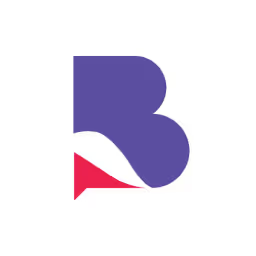Datagma Alternatives
An in-depth look at 10 Datagma alternatives. This guide compares each tool on features, pricing, and data quality to inform your choice.
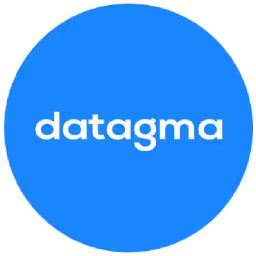
Many people use Datagma for good reasons. It performs well for finding phone numbers and enriching data. Users often find its contact information accurate and appreciate its ease of use and affordability. It is a solid tool for specific data tasks.
However, no tool is perfect. Some users report occasional data inaccuracies or integration issues. This might lead you to look for other options. We've analyzed the top alternatives to help you choose the right fit for your needs. Let's get started.
Consider 11x for Sales Automation
For sales teams looking to automate tasks, digital workers are an option to consider. They can handle research and outreach, freeing up your representatives to focus on high-value activities like closing deals.
11x provides digital workers designed for sales workflows. If you are exploring ways to support your sales efforts with automation, this tool might be a relevant choice for your organization.
11x operates as an all-in-one GTM platform. It employs AI agents to manage the sales process autonomously, from prospecting to outreach.
Its AI agent, Alice, finds prospects, handles outreach on email and LinkedIn, and maintains CRM data. Another agent, Julian, qualifies inbound leads and books appointments.
The platform consolidates the tech stack. It removes the need for separate tools for data enrichment, outreach, or email warmup by unifying these functions.
Datagma Alternatives
We will now examine the top alternatives to Datagma. Each option is reviewed based on pricing, main features, and its specific advantages and disadvantages compared to Datagma.
1) Clearbit
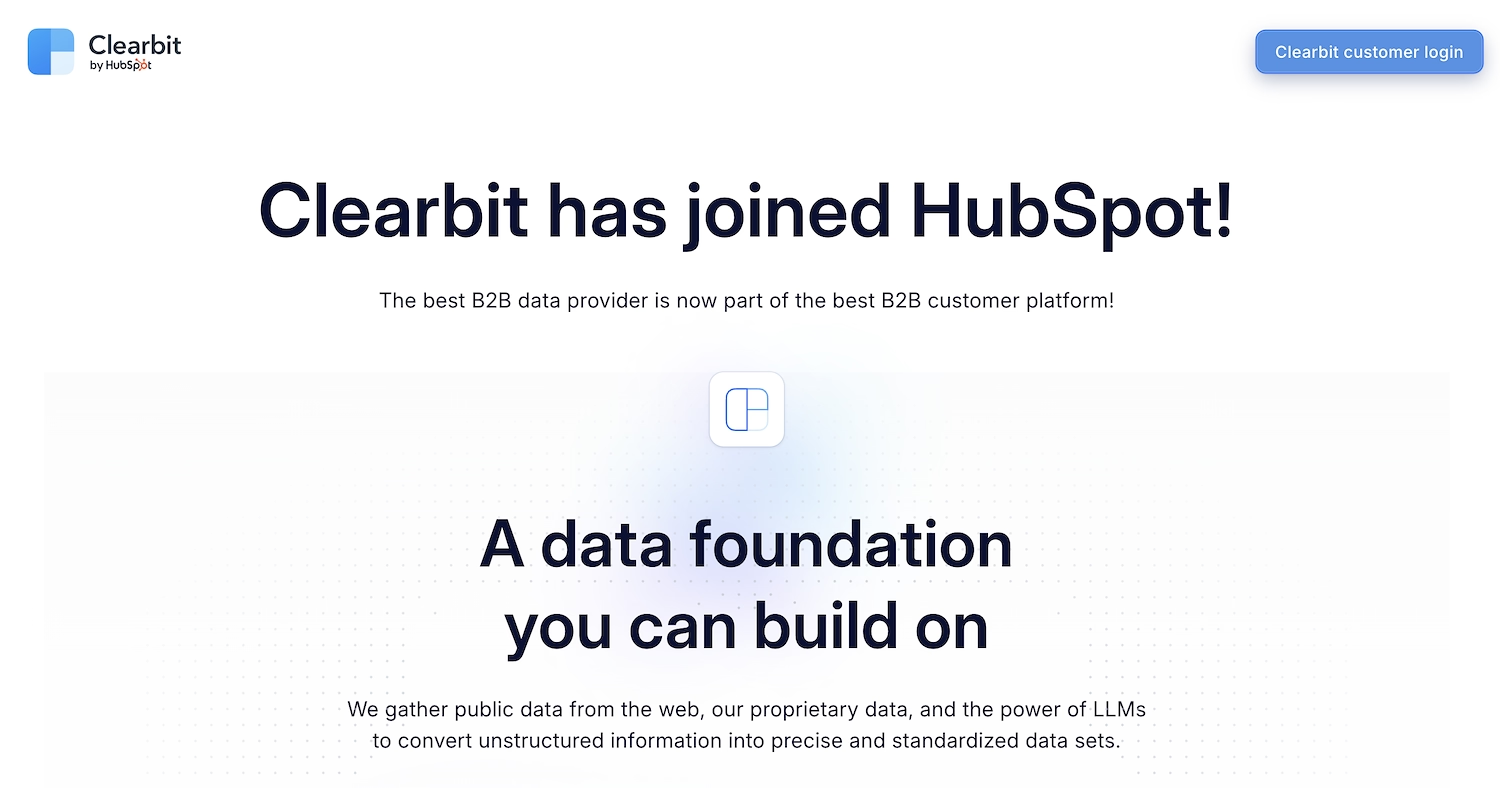
Clearbit, now part of HubSpot, provides B2B data for go-to-market teams. The service collects public and proprietary data and uses large-language-model techniques to create standardized datasets.
It delivers company and contact data to enrich records, qualify leads, and identify anonymous website visitors. This allows teams to focus outreach on accounts that show intent.
Clearbit's Main Features
- Scores and routes leads in real-time using deep industry classifications, such as 6-digit NAICS, GICS, and SIC, along with corporate hierarchy data.
- Identifies anonymous website visitors that match an ideal customer profile through IP intelligence, surfacing active accounts for outreach.
- Reduces form fields by automatically enriching data, which can increase conversion rates by removing friction for the user.
- Aggregates public web data and proprietary sources, using large-language-model techniques to produce standardized B2B datasets.
How Clearbit Compares to Datagma
Average Review Score: 4.4/5 stars based on 626 G2 reviews.
- Clearbit identifies anonymous website visitors that fit an ideal customer profile. This provides active accounts for outreach, a capability not present in Datagma.
- The platform enriches records with over 100 data points. This makes it possible to shorten website forms to increase conversions, a more advanced use of enrichment compared to Datagma.
- Its deep integration with HubSpot provides a more unified workflow. This contrasts with Datagma, where users sometimes report integration challenges.
- The service uses machine learning to create standardized B2B datasets from multiple sources. This can result in more reliable data than the occasional inaccuracies reported with Datagma.
Potential Downsides of Clearbit vs. Datagma
- Clearbit often has a higher price point. This makes it a better fit for larger companies, while Datagma's affordability may appeal more to startups or teams with smaller budgets.
- The platform may require a longer setup time, sometimes up to a month. This is different from Datagma, which users often find simple to start using right away.
- Some users report that contact data can occasionally be outdated. While this is a common issue across data platforms, Datagma is often noted specifically for its strength in finding accurate phone numbers.
Pricing and Budget Considerations
Datagma offers transparent pricing with a free plan, a Discover plan at $39 per month, and a Premium plan starting at $69 per month. Clearbit does not publish its pricing, indicating a custom, quote-based model that is generally more expensive, making Datagma a more budget-friendly option for smaller teams.
2) ZoomInfo SalesOS
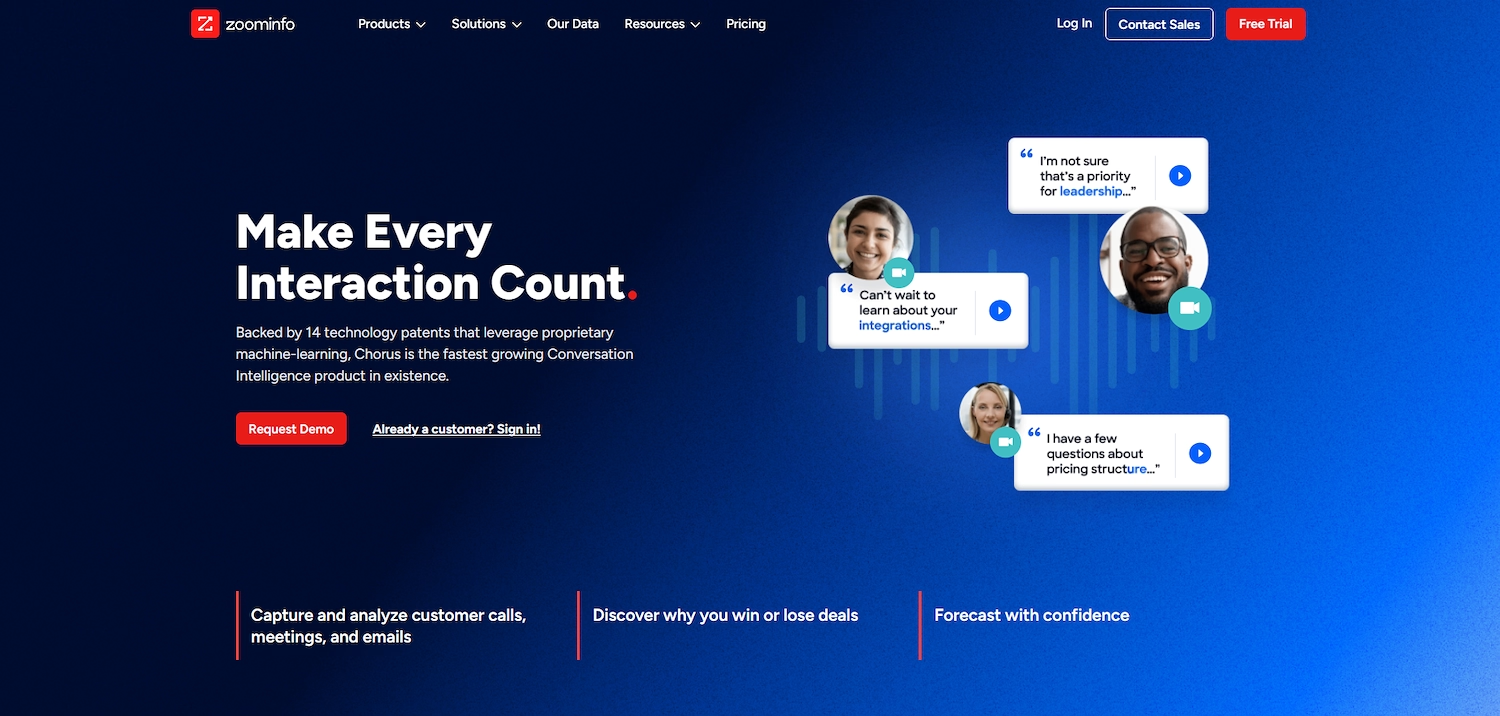
ZoomInfo SalesOS is a go-to-market intelligence platform for B2B organizations. It unifies contact and company data, buyer-intent signals, and engagement tools into a single system. The platform helps sales, marketing, and recruiting teams identify and connect with buyers.
Users can build prioritized lead lists with verified contact data. Teams can also source candidates for recruitment with updated contact information. The platform automates certain manual tasks and integrates with other tools in a tech stack.
ZoomInfo SalesOS's Main Features
- Analyzes call and meeting interactions using its conversation intelligence tool, Chorus.
- Identifies prospects ready to buy through real-time buyer-intent signals.
- Uses a generative-AI companion, Copilot, to surface insights and draft outreach.
- Turns anonymous website visitor tracking into sales pipeline opportunities.
How ZoomInfo SalesOS Compares to Datagma
Average Review Score: 4.5/5 stars based on 8,738 G2 reviews.
- ZoomInfo SalesOS provides buyer-intent signals to identify prospects ready to purchase. This is a feature not available in Datagma, which focuses more on contact data retrieval.
- The platform includes a conversation intelligence tool, Chorus, to analyze sales calls and meetings. This offers a different level of sales insight compared to Datagma's data enrichment capabilities.
- Its generative-AI companion, Copilot, suggests who to contact and what to say. This automates outreach in a way that is distinct from Datagma's manual data lookup process.
- This tool identifies anonymous website visitors and turns them into sales leads. Datagma, in contrast, does not offer a native feature for tracking website visitor activity.
Potential Drawbacks of ZoomInfo vs. Datagma
- ZoomInfo SalesOS often has a higher price tag, which is more suitable for large enterprises. In contrast, Datagma offers transparent, lower-priced plans that are accessible for smaller teams.
- The platform's setup can be more involved, sometimes taking a month to implement. This is different from Datagma, which users often find simple to start using right away.
- Some users report that its contact information can sometimes be out of date. Datagma is often noted for its specific strength in providing accurate and current phone numbers.
Pricing and Budget Considerations
Datagma offers transparent pricing with a free plan and paid tiers starting at $39 per month, making it a budget-friendly option. ZoomInfo SalesOS uses a custom, quote-based model and does not publish its pricing, which generally indicates a higher cost aimed at enterprise clients. For accurate pricing, we recommend visiting the ZoomInfo SalesOS 's official website.
3) Apollo.io
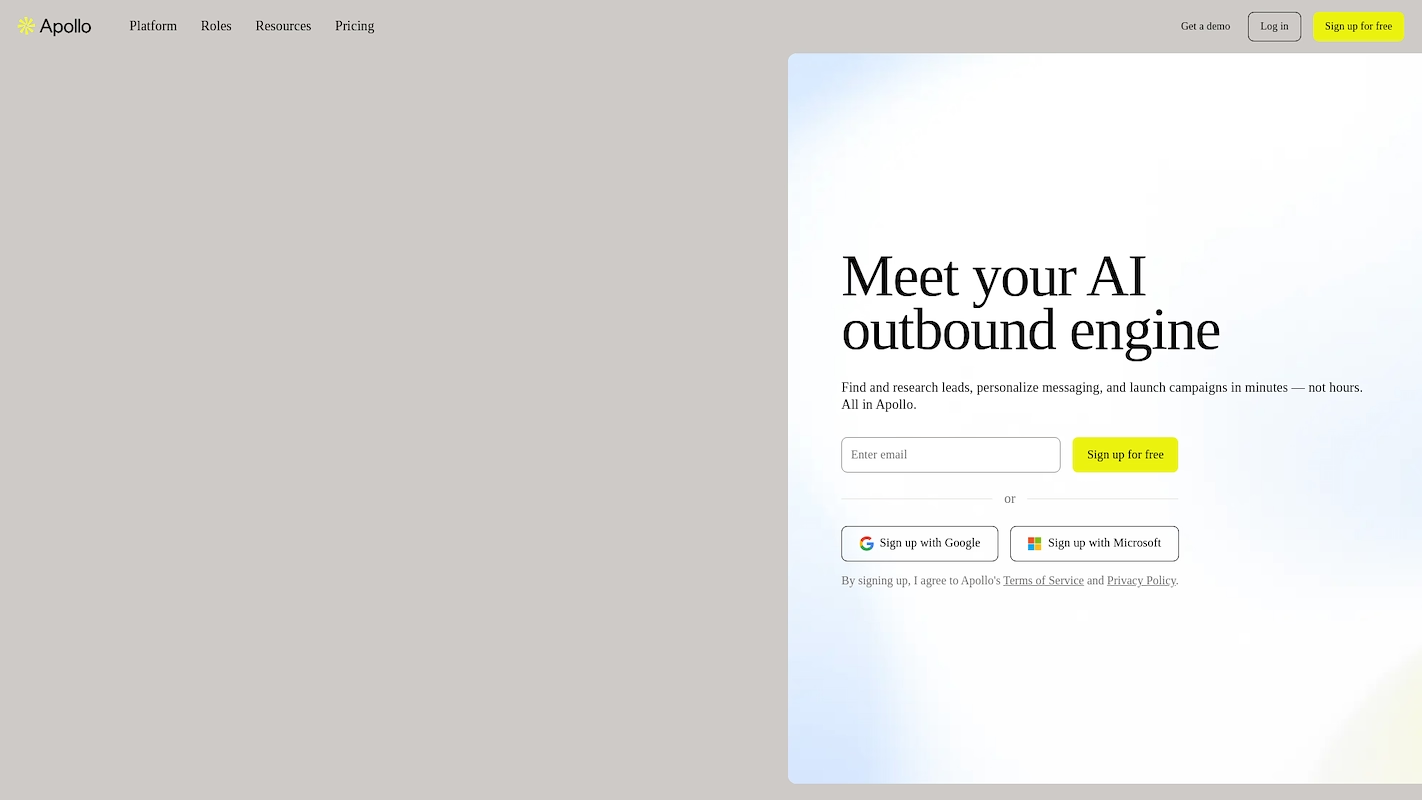
Apollo.io is a sales intelligence platform with a database of contacts and companies. It provides tools for email and phone number discovery, data enrichment, and job change alerts.
The platform supports sales and marketing teams to identify and connect with potential customers. It combines data with engagement workflows to help users manage outreach.
Apollo.io's Main Features
- Provides access to a database of contacts and companies for prospecting.
- Alerts users with job change notifications to identify new opportunities.
- Includes engagement workflows to help users create and manage outreach sequences.
How Apollo.io Compares to Datagma
Average Review Score: 4.7/5 stars based on 8,904 G2 reviews.
- Apollo.io includes an engagement suite to create and manage outreach sequences. This is different from Datagma, which focuses on providing contact data without built-in outreach tools.
- The platform provides access to a database of over 210 million contacts. This large scale offers a wider pool for prospects compared to the more targeted data retrieval of Datagma.
- It sends job change alerts to users. This feature helps identify new opportunities when a contact moves to a new company, a function not native to Datagma.
- This tool combines a large contact database with sales engagement workflows, creating an all-in-one system. Datagma, in contrast, is a specialized tool for data enrichment and contact retrieval.
Potential Downsides of Apollo.io vs. Datagma
- Some users report that Apollo.io's contact data can be out of date. In comparison, Datagma is often noted for its specific strength in providing accurate and current phone numbers.
- The platform's extensive features may introduce a learning curve for new teams. Datagma, in contrast, is frequently described as a more straightforward tool that is simple to use immediately.
- Its all-in-one approach includes many features beyond data enrichment. For teams that only need contact retrieval, Datagma offers a more focused solution without the complexity of extra tools.
Pricing and Budget Considerations
Both platforms offer a free plan, but Datagma is more budget-friendly with paid tiers starting at $39 per month, compared to Apollo.io's $49 starting price for its all-in-one platform. For detailed pricing, visit Apollo.io 's official website.
4) Lusha
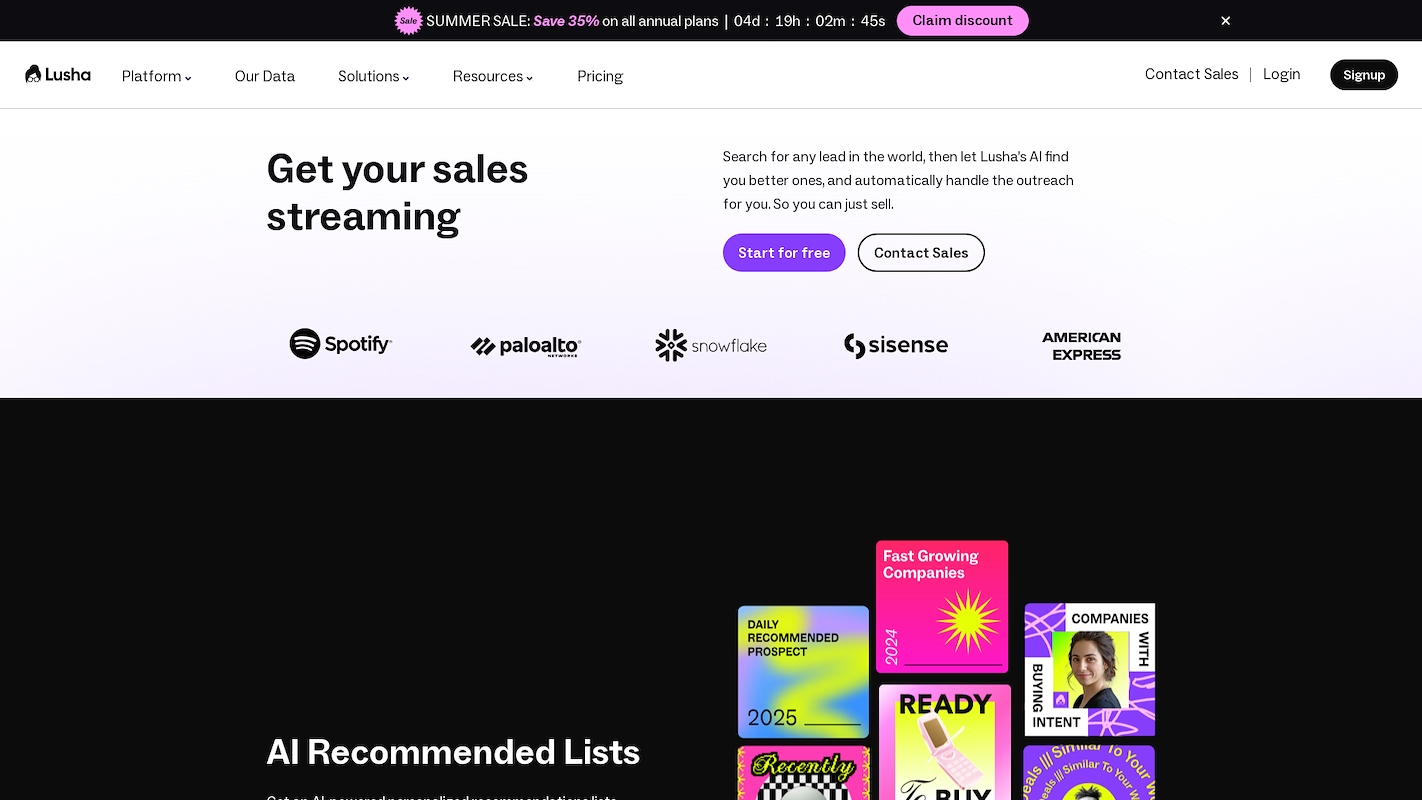
Lusha is a platform for sales and marketing teams. It offers tools for data enrichment and contact discovery. Users can find email addresses and phone numbers for prospects. The service also supplies information on job changes to help identify new sales opportunities.
The platform provides direct contact details for B2B outreach efforts. Teams use it to create accurate prospect lists and connect with potential customers.
Lusha's Main Features
- Identifies in-market buyers and sends real-time notifications based on intent triggers.
- Creates live, auto-updating lead lists that add new prospects at user-defined intervals.
- Automates and personalizes email sequences using AI-generated copy.
- Records and analyzes sales meetings to provide insights.
How Lusha Compares to Datagma
Average Review Score: 4.3/5 stars based on 1,516 G2 reviews.
- Lusha offers AI Prospect Playlists that automatically build and refresh lead lists. This is different from Datagma, which centers on manual data retrieval.
- The tool identifies in-market buyers and sends real-time alerts. This provides a proactive sales signal not found in Datagma.
- It automates and personalizes email outreach with AI-generated copy. Datagma provides contact data but lacks tools for content creation.
- This platform records and analyzes sales meetings for insights. This conversation intelligence is a feature distinct from Datagma's data enrichment services.
Potential Downsides of Lusha vs. Datagma
- Some users report that Lusha's contact data can be inaccurate or outdated. This is different from Datagma, which is often recognized for its reliable phone number data.
- The platform's credit system may feel restrictive, particularly for phone numbers. In comparison, Datagma offers straightforward plans that some teams might find easier to manage.
- Its broad range of features, such as meeting analysis, might be unnecessary for teams that only need contact data. Datagma provides a more focused solution for data enrichment, which can be simpler for specific tasks.
Pricing and Budget Considerations
Both platforms provide a free plan. Lusha's paid tiers are slightly more affordable, with its Pro plan at $36 per month compared to Datagma's Discover plan at $39 per month. This trend continues with Lusha's Premium plan at $59 per month, while Datagma's starts at $69 per month.
5) Hunter
Hunter is a platform for finding and verifying professional email addresses. It provides tools for sales and marketing teams to connect with contacts. The service includes an email finder, a domain search tool, and an email verifier for list cleaning.
Hunter's Main Features
- Finds email addresses for specific professionals by name and company.
- Performs domain searches to list all email addresses associated with a website.
- Verifies the deliverability of email addresses individually or in bulk.
- Offers a simple email outreach tool to run cold email campaigns.
How Hunter Compares to Datagma
Average Review Score: 4.4/5 stars based on 531 G2 reviews.
- Hunter specializes in email discovery and verification. This is a more focused approach compared to Datagma's broader data enrichment, which includes phone numbers.
- The platform includes a simple outreach tool for email campaigns. Datagma does not have a native feature for sending emails.
- Its domain search feature finds email patterns and addresses at a company. This offers a different way to prospect than Datagma's individual contact lookups.
- Hunter's core function is finding valid email addresses. This makes it a strong choice for teams whose primary need is email outreach.
Potential Downsides of Hunter vs. Datagma
- Hunter does not provide phone numbers. Teams that need mobile or direct-dial numbers will find Datagma to be a more suitable option.
- The platform offers limited data points beyond email addresses. Datagma provides a wider range of enrichment data, such as company size and tech stack.
- Some users find the number of free searches to be restrictive. This may require an upgrade to a paid plan sooner than with Datagma's free tier.
Pricing and Budget Considerations
Both platforms offer a free plan. Hunter's paid plans start at $49 per month, which is slightly higher than Datagma's starting price of $39 per month. This makes Datagma a more budget-conscious choice for teams that need both email and phone data.
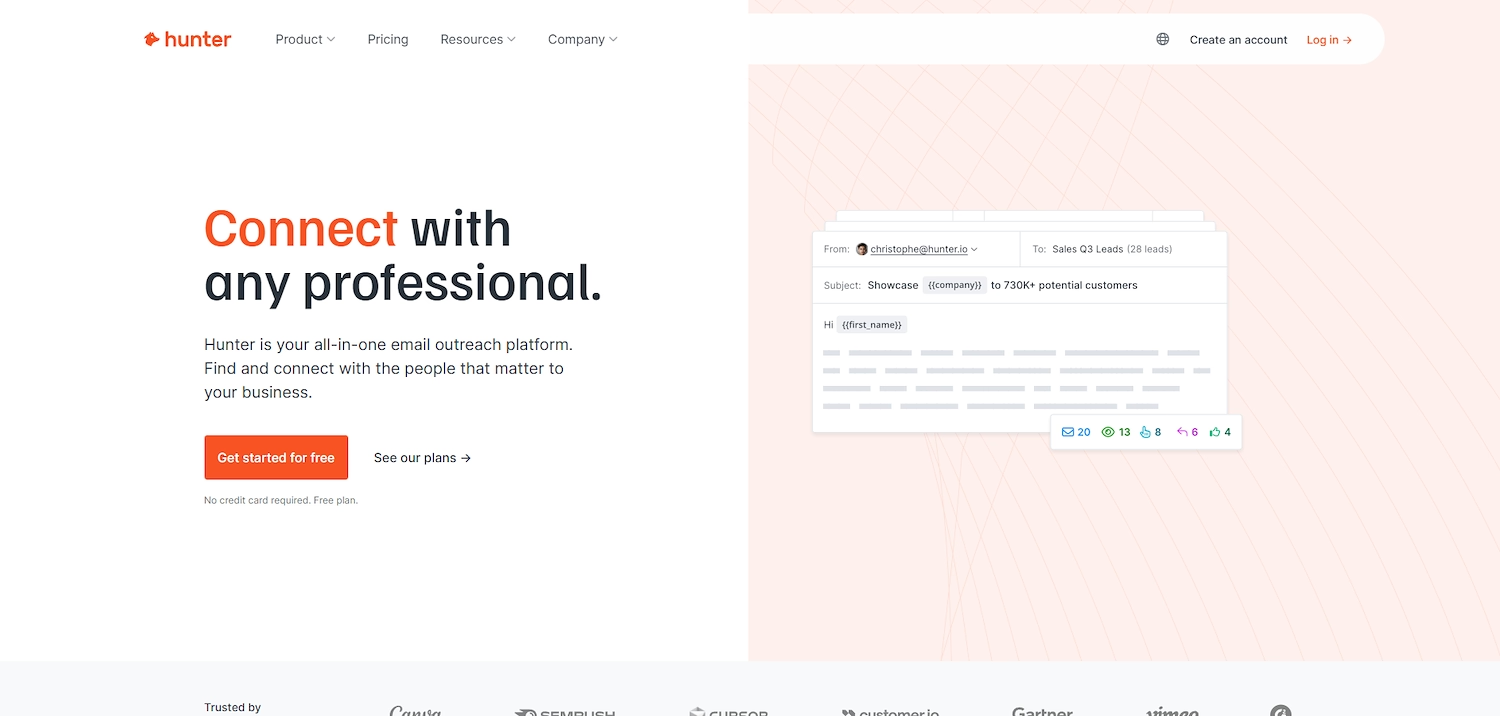
Hunter is a platform to find and verify professional email addresses. It helps sales and marketing teams connect with contacts. The service includes an email finder, a domain search tool, and an email verifier. It does not provide phone numbers.
The platform also has a simple tool for email outreach to support cold email campaigns. It is a focused tool for email discovery.
Hunter's Main Features
- Returns all publicly available email addresses from a given domain name or company URL.
- Composes personalized messages, schedules follow-ups, and tracks performance analytics for cold-email campaigns.
- Lists websites according to the specific technology stack they use.
- Finds or verifies thousands of emails at once by uploading a spreadsheet.
How Hunter Compares to Datagma
Average Review Score: 4.4/5 stars based on 592 G2 reviews.
- Hunter specializes in email discovery and verification, offering a focused tool compared to Datagma's broader data enrichment that includes phone numbers.
- It includes a simple outreach tool to run cold email campaigns, a feature not available within Datagma.
- The platform's domain search finds all email addresses associated with a company website, providing a different prospecting approach than Datagma's individual lookups.
- This tool allows users to verify email lists in bulk by uploading a file, a specific function for list cleaning that is distinct from Datagma's primary features.
Potential Downsides of Hunter vs. Datagma
- Hunter focuses exclusively on email addresses and does not provide phone numbers. In contrast, Datagma offers both email and phone number data, which is useful for multi-channel outreach campaigns.
- The tool provides limited data for enrichment beyond contact emails. Datagma offers a broader set of data points, like company tech stack and size, which helps teams qualify leads more deeply.
- Hunter's platform is built around email-related tasks. For teams that need various data types, Datagma provides a more unified solution as it also provides company details with contact information.
Pricing and Budget Considerations
Both platforms provide a free plan. Datagma's paid tiers start at $39 per month, while Hunter's begin at $49 per month. This makes Datagma a more budget-conscious option for teams needing both email and phone data, a feature set Hunter does not cover.
Get Started with 11x Digital Workers
If your sales team is looking to use digital workers for tasks like prospecting and outreach, 11x offers a platform built for this purpose. Its AI agents can manage parts of the sales process, allowing your team to focus on closing deals.
For organizations interested in how AI agents can support sales, visiting the 11x website is a good next step. You can learn more about their digital workers and how they operate within a sales workflow.
With 11x, our AI agents manage your sales process. Alice identifies prospects, enriches their data, and handles outreach. Julian qualifies leads and schedules meetings. We consolidate the GTM stack, replacing separate tools for data, outreach, and email warmup on one platform.
Book a demo to see the platform in action.
6) Snov.io
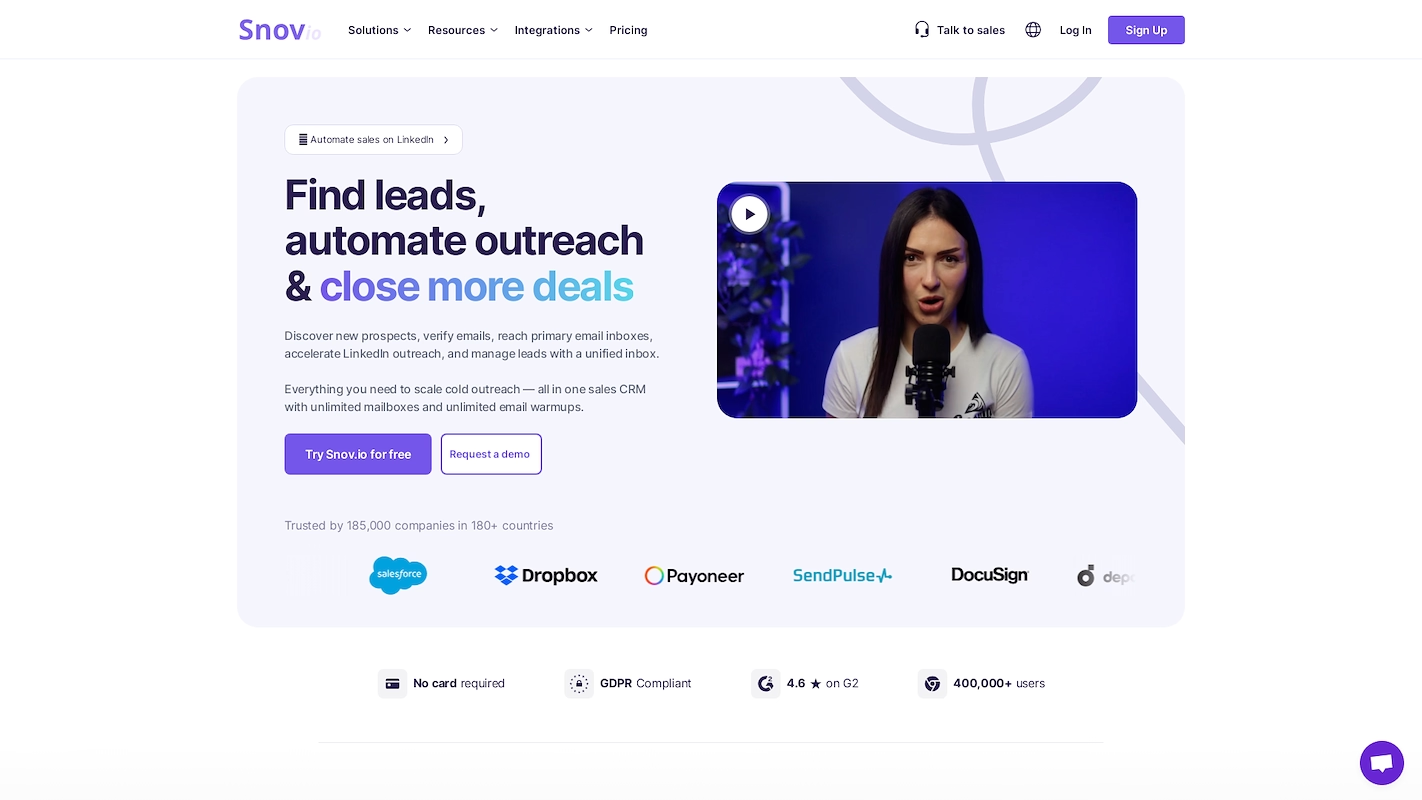
Snov.io is a platform for sales and marketing teams. It provides tools to find emails and phone numbers for prospects. The service also enriches contact data and tracks job changes to identify new sales opportunities.
Teams use the platform to build accurate prospect lists and connect with potential customers.
Snov.io's Main Features
- Runs cold email and multichannel campaigns with unlimited sender accounts and a unified inbox.
- Manages the sales pipeline with a built-in sales CRM that syncs with Google Calendar.
- Optimizes email deliverability with an automated warm-up tool and domain placement checkers.
- Verifies emails with a 7-tier process that achieves 98% accuracy and bypasses gray-listing.
How Snov.io Compares to Datagma
Average Review Score: 4.6/5 stars based on 450 G2 reviews.
- Snov.io includes tools to run cold email campaigns with a unified inbox. This is different from Datagma, which provides contact data but has no built-in outreach features.
- The platform offers a built-in sales CRM that syncs with Google Calendar to manage the sales pipeline. Datagma, in comparison, is a data tool and does not have CRM functions.
- It provides an automated warm-up tool to help improve email deliverability. This is a feature for outreach optimization not found in Datagma.
- This tool uses a 7-tier process for email verification to achieve 98% accuracy. This offers a specialized verification system, while Datagma focuses on broader data enrichment.
Potential Downsides of Snov.io vs. Datagma
- Some users report that Snov.io's contact data can be less reliable. In comparison, Datagma is often recognized for its accuracy, particularly with phone numbers, which is its core function.
- Its all-in-one platform includes a CRM and outreach tools, which may create a learning curve. Datagma provides a simpler experience focused only on data enrichment for teams with specific needs.
- This tool provides less detailed company information, like the technology stack a company uses. Datagma includes this data, which helps teams create more targeted outreach based on a prospect's current software.
Pricing and Budget Considerations
Both platforms offer a free plan, and their starter tiers are identically priced at $39 per month. Datagma's Premium plan starts at $69 per month, while Snov.io's Pro plan is $99 per month. This price difference reflects Snov.io's all-in-one features, including a CRM and outreach tools.
7) LeadIQ
LeadIQ is a sales prospecting platform that helps sales teams find and verify contact information. It focuses on building accurate prospect lists and integrating with CRM systems to support outreach workflows.
LeadIQ's Main Features
- Captures contact data from LinkedIn and other websites with a browser extension.
- Verifies email addresses and phone numbers in real-time to reduce bounce rates.
- Syncs captured leads and contact information directly to Salesforce and other CRMs.
- Tracks job changes and other triggers to identify timely sales opportunities.
How LeadIQ Compares to Datagma
Average Review Score: 4.2/5 stars based on 680 G2 reviews.
- LeadIQ's primary function is capturing contact data through its browser extension. This workflow is different from Datagma's focus on bulk enrichment and API access.
- The platform emphasizes deep integration with CRMs like Salesforce. It syncs data directly, which can be a more seamless process than what some users report with Datagma.
- It provides real-time verification for captured contacts. This helps ensure data accuracy at the point of collection, a different approach from Datagma's database-centric model.
- This tool is built for individual sales representatives to build lists as they browse. Datagma is often used for broader data enrichment tasks across a marketing or sales operations team.
Potential Downsides of LeadIQ vs. Datagma
- Some users report that the accuracy of phone numbers can be inconsistent. Datagma is often noted for its specific strength in providing reliable phone data.
- LeadIQ's data capture is primarily a manual process via its extension. Teams needing automated, large-scale data enrichment might find Datagma's features more suitable.
- The platform's data points may be less extensive than Datagma's. Datagma often includes details like company tech stack, which LeadIQ might not always provide.
Pricing and Budget Considerations
Both platforms offer a free plan. LeadIQ's paid plans start at $39 per month, which is identical to Datagma's starter plan. However, pricing for higher tiers can vary based on team size and feature needs, often requiring a custom quote for enterprise use.
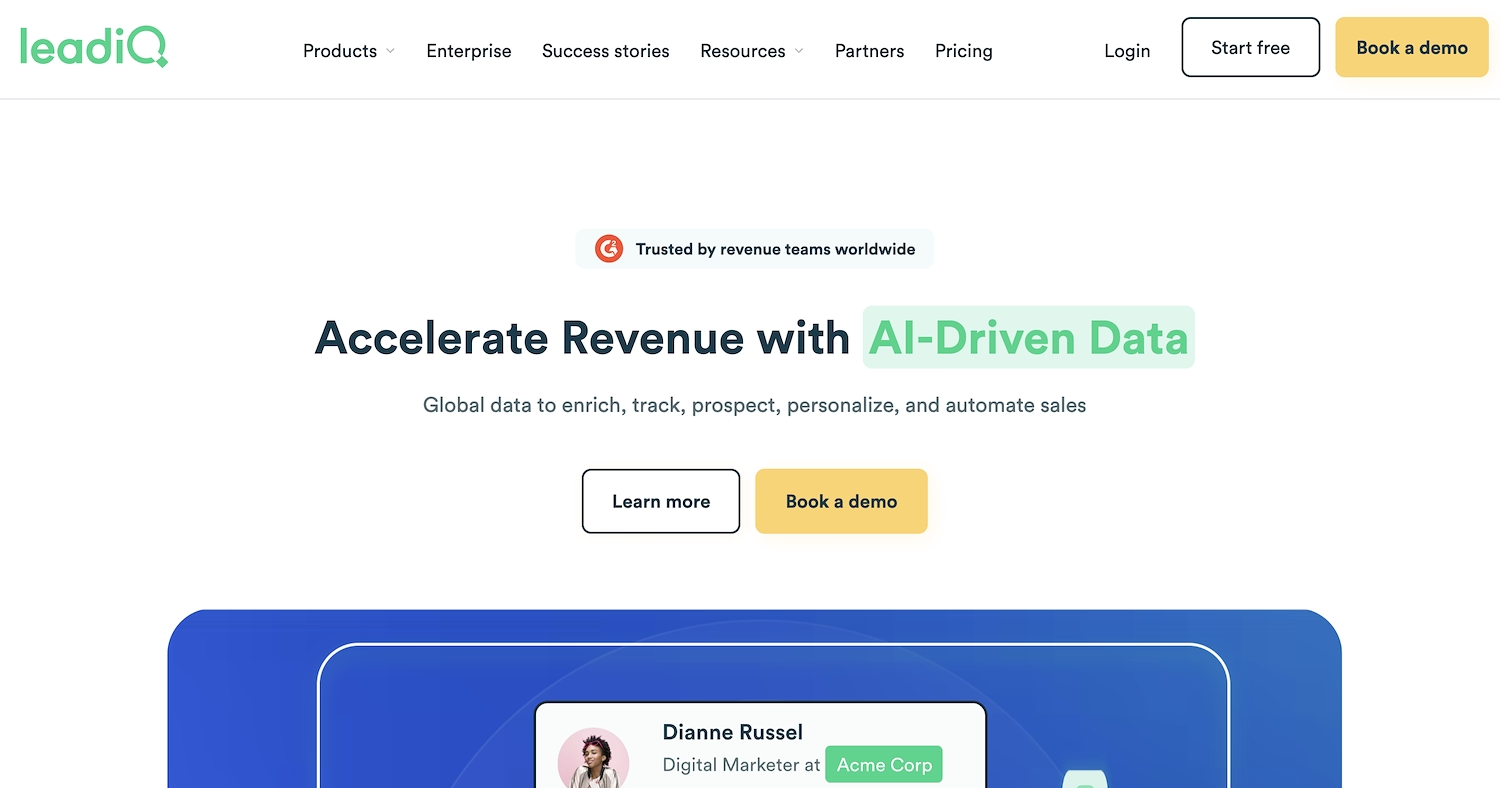
LeadIQ is a sales prospecting platform. Sales teams use it to find and verify contact information, such as email addresses and phone numbers. The tool helps build accurate prospect lists and tracks job changes to identify timely sales opportunities. It captures data through a browser extension.
This information syncs directly with CRM systems like Salesforce. This process supports outreach workflows for sales representatives who build lists as they browse websites.
LeadIQ's Main Features
- Generate personalized outreach messages in seconds using an AI tool called Scribe.
- Track job changes and promotions automatically with a feature for champion tracking.
- Capture contact data from LinkedIn with a single click and sync it to CRM and sales engagement tools.
- Enrich CRM data in bulk with customizable field mapping designed for revenue operations teams.
How LeadIQ Compares to Datagma
Average Review Score: 4.2/5 stars based on 1,097 G2 reviews.
- LeadIQ includes an AI tool, Scribe, to generate personalized outreach messages. This is a content creation feature that Datagma does not have.
- The platform's browser extension captures contact data from LinkedIn with a single click. This workflow is different from Datagma's focus on bulk enrichment.
- It syncs captured leads directly to CRMs like Salesforce. This creates a more integrated process for sales reps compared to Datagma's data export functions.
- This tool automatically tracks job changes and promotions. It provides timely sales triggers, a monitoring feature not present in Datagma.
Potential Downsides of LeadIQ vs. Datagma
- Some users report that LeadIQ's phone number data can be less consistent. This is different from Datagma, which is often recognized for its strength in providing reliable phone data.
- The tool's data capture is primarily a manual process that uses a browser extension. For teams that need automated, large-scale data enrichment, Datagma's bulk processing features may be more suitable.
- Its platform provides fewer extensive data points for enrichment. Datagma, in comparison, often includes details like a company's technology stack, which LeadIQ might not always provide.
Pricing and Budget Considerations
Both platforms offer a free plan. Datagma is more budget-friendly, with its Discover plan at $39 per month and Premium plan starting at $69 per month. In comparison, LeadIQ's Essential plan is $45 per month and its Pro plan is $89 per month, making Datagma the more cost-effective option.
8) UpLead
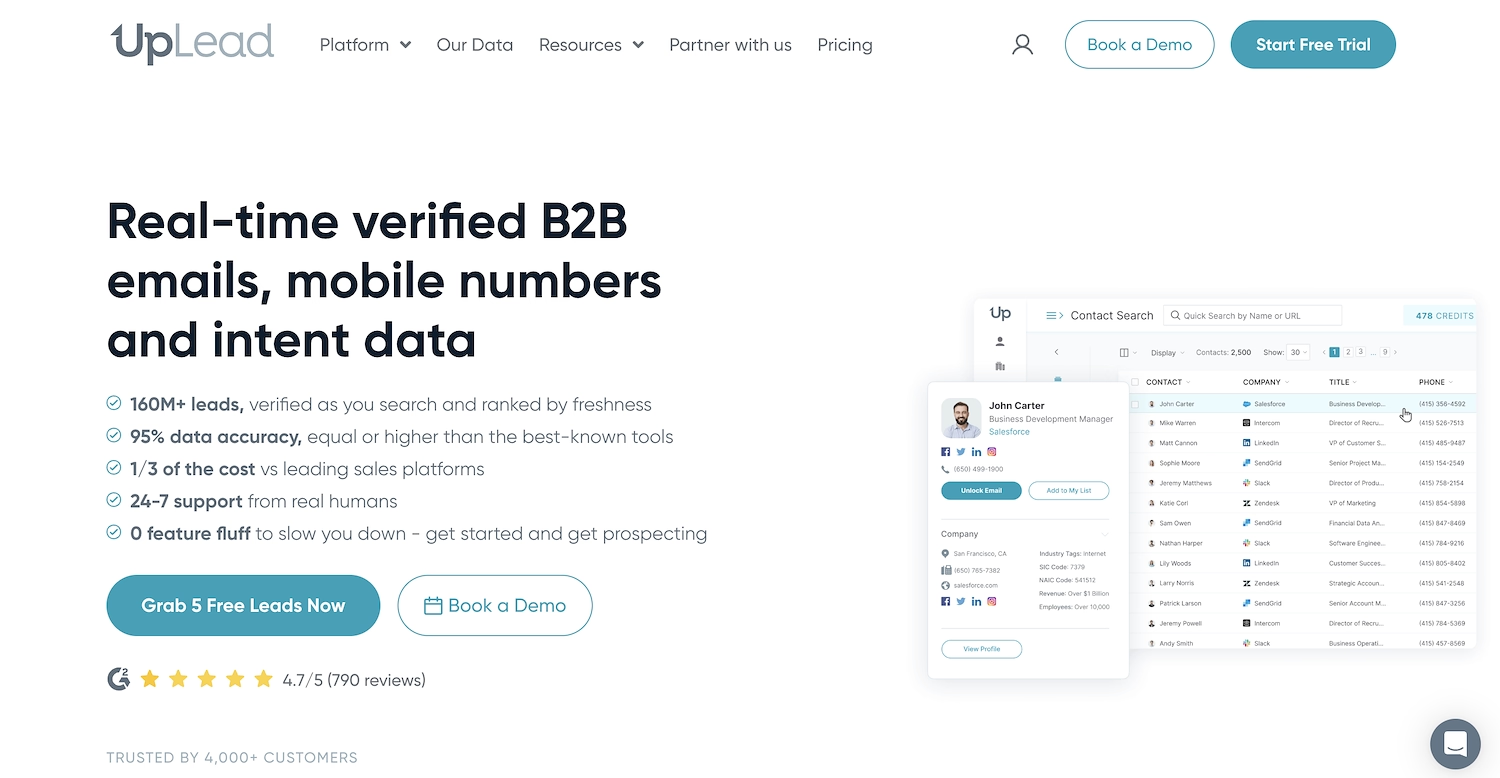
UpLead is a B2B data provider for contact and company information. The platform finds email addresses and phone numbers for prospects. It also enriches records and tracks job changes. Sales teams use this information to build accurate lists and identify timely opportunities for outreach.
UpLead's Main Features
- Verifies emails in real-time to ensure data accuracy at the point of capture.
- Uses intent data to help users find in-market buyers who are actively looking for solutions.
- Provides over 50 search filters for building highly targeted and granular prospect lists.
- Integrates with major CRMs like Salesforce and HubSpot, as well as Zapier, to automate workflows.
How UpLead Compares to Datagma
Average Review Score: 4.7/5 stars based on 797 G2 reviews.
- UpLead provides intent data to help find buyers who are actively looking for solutions, a feature for proactive prospecting not available in Datagma.
- It verifies emails in real-time at the moment of capture, which is a different approach to data accuracy compared to Datagma's database-centric model.
- The platform includes over 50 search filters for building highly targeted prospect lists, allowing for more granular searches than Datagma's data retrieval functions.
- This tool integrates directly with major CRMs like Salesforce and HubSpot, which can provide a more automated workflow compared to Datagma.
Potential Downsides of UpLead vs. Datagma
- UpLead offers many features like intent data and over 50 search filters. For teams that need a simple tool for contact lookup, Datagma provides a more focused and straightforward experience.
- The platform provides less detail on a company's technology stack. Datagma includes this data, which helps teams to better qualify leads and tailor their outreach based on a prospect's existing software.
- Its pricing starts at a higher point. The entry-level paid plan is $99 per month, while Datagma's starter plan is $39 per month, which makes Datagma a more accessible option for smaller budgets.
Pricing and Budget Considerations
Both platforms offer a free plan. Datagma is more budget-friendly, with paid plans starting at $39 per month, while UpLead's entry-level plan is $99 per month. This makes Datagma a more accessible option for smaller teams, whereas UpLead's higher price reflects its more extensive feature set.
9) Cognism
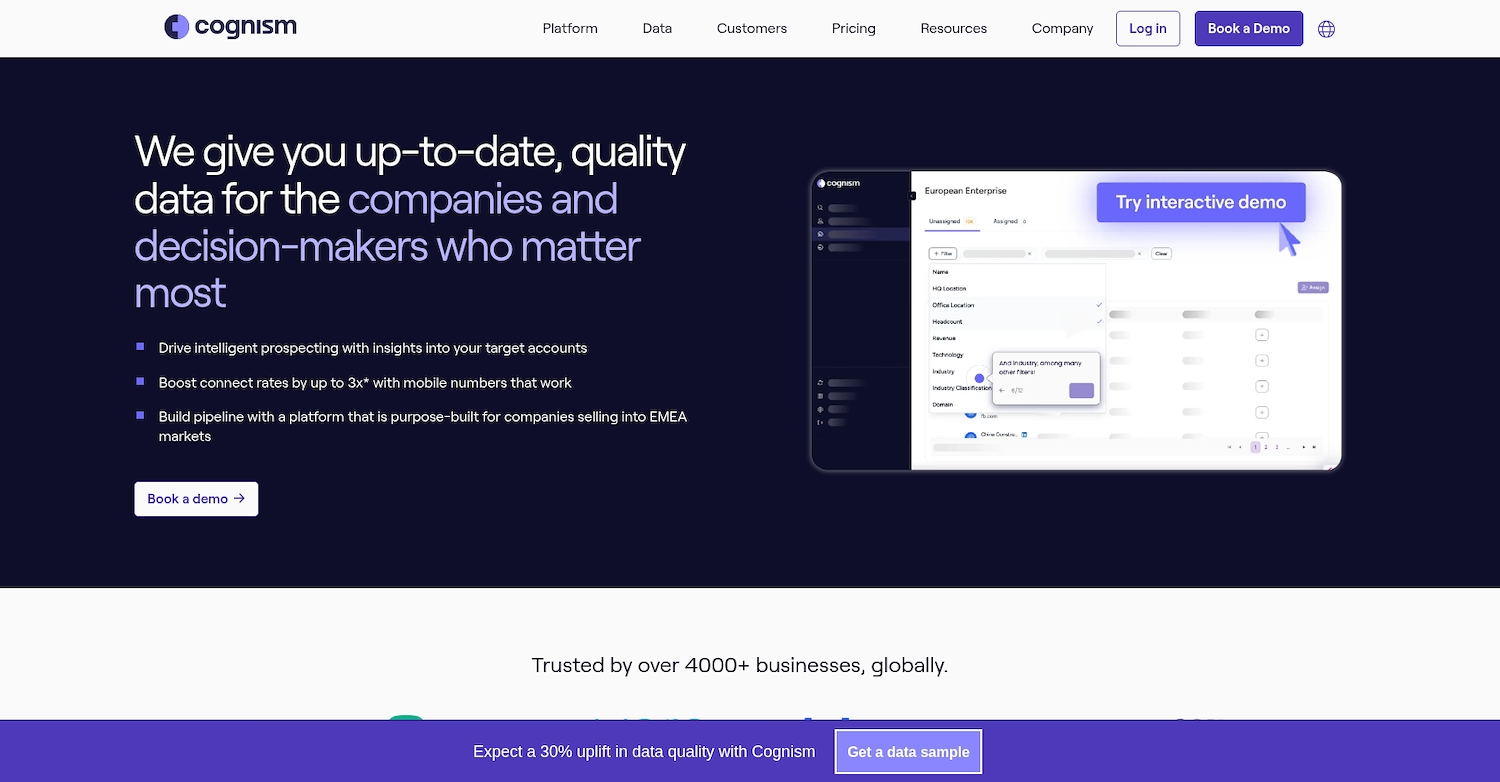
Cognism is a sales intelligence platform with contact and company data for B2B teams. It finds verified email addresses and phone numbers for prospects. The service also enriches data records and provides alerts on job changes to help teams find new sales opportunities.
Cognism's Main Features
- Provides industry research data for market analysis.
- Builds targeted prospect lists with its lead builder tool.
- Integrates with CRM and marketing automation platforms.
- Validates leads to ensure data quality and accuracy.
How Cognism Compares to Datagma
Average Review Score: 4.6/5 stars based on 1,033 G2 reviews.
- Cognism provides strong B2B contact data for European markets. This focus offers reliable direct dials in the EMEA and UK regions, a more specialized offering compared to Datagma's broader data coverage.
- It includes intent data to identify buyers who actively search for solutions. This feature allows for more timely outreach compared to Datagma, which focuses on contact data retrieval and does not track buyer signals.
- The platform offers deep integrations with CRMs like Salesforce and HubSpot. This provides a more connected workflow than Datagma, where some users report integration challenges.
- This tool provides GDPR-compliant data, a key consideration for teams that prospect in Europe. This offers a specific compliance assurance not highlighted as a primary feature for Datagma.
Potential Downsides of Cognism vs. Datagma
- Cognism's pricing model is quote-based and generally higher. This can be a barrier for smaller teams, while Datagma offers transparent, lower-priced plans that are more accessible for companies with limited budgets.
- Some users report that the platform's setup can take up to a month. This is different from Datagma, which is often noted for its simplicity and ease of use right from the start.
- The tool provides a wide range of features, including intent data. For teams that only need straightforward contact and company data enrichment, Datagma offers a more focused solution without the added complexity.
Pricing and Budget Considerations
Datagma provides transparent pricing with paid plans starting at $39 per month, making it an accessible option for smaller teams. In contrast, Cognism uses a custom, quote-based model geared toward enterprise clients. For exact pricing, we recommend visiting Cognism's official website.
10) Seamless.AI
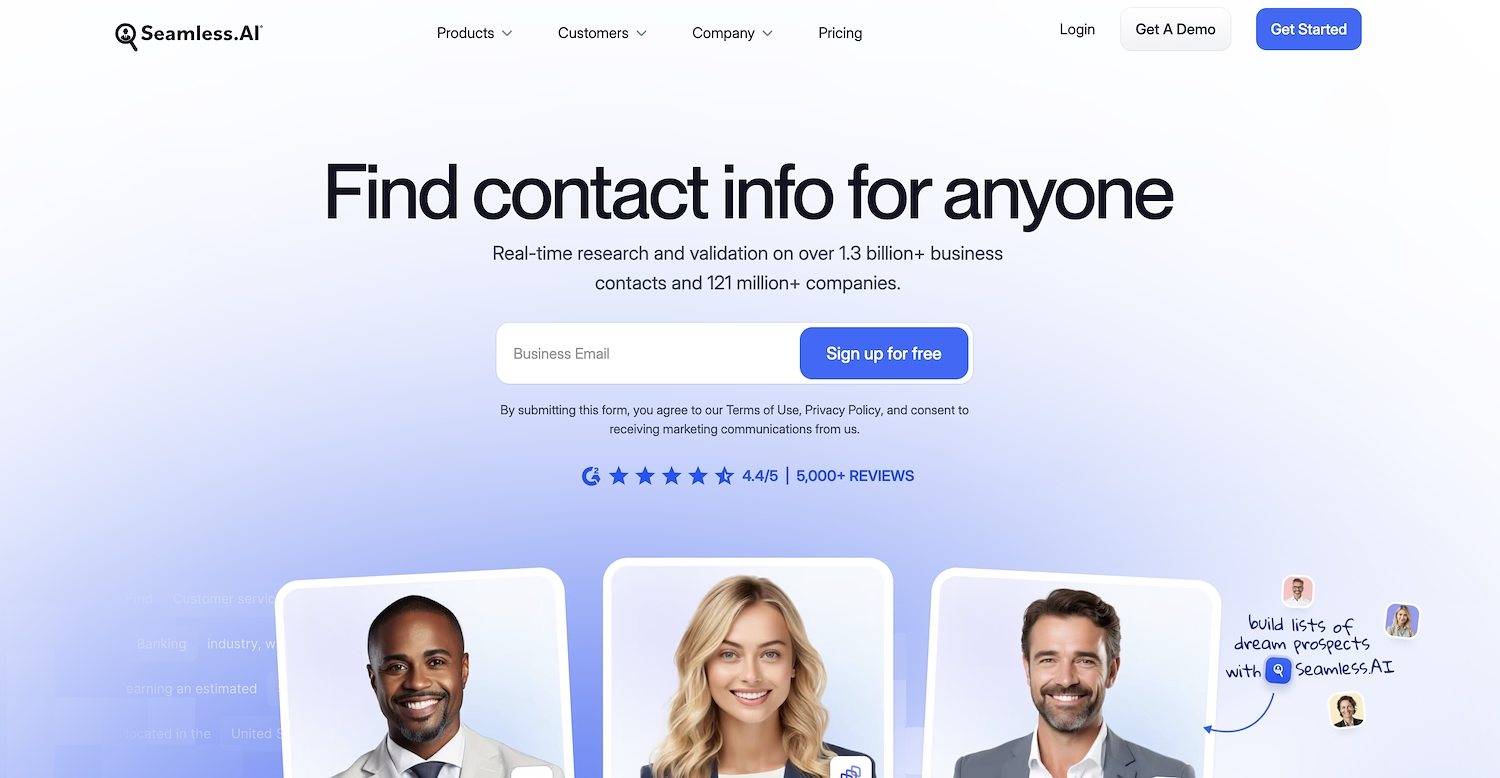
Seamless.AI is a sales intelligence platform for B2B teams. It provides verified email addresses and phone numbers for prospects. The service also enriches contact data and tracks job changes. Teams use this information to build accurate prospect lists and connect with potential customers.
Seamless.AI's Main Features
- Builds prospect lists using a lead builder tool that searches a database of over 1.7 billion contacts in real-time.
- Integrates with CRM and marketing automation platforms to sync contact data directly into sales workflows.
- Enriches and cleans data, providing lead intelligence signals like buyer intent and recent job changes.
- Provides industry research data to help teams perform market analysis.
How Seamless.AI Compares to Datagma
Average Review Score: 4.4/5 stars based on 5,067 G2 reviews.
- Seamless.AI uses a real-time search engine to access a database of over 1.7 billion contacts. This is a different approach compared to Datagma, which focuses on targeted data retrieval and enrichment.
- It provides buyer intent data to help identify prospects who are actively looking for solutions. This offers a proactive sales signal that is different from Datagma's contact data enrichment.
- The platform offers direct integrations with major CRMs like Salesforce and HubSpot. This can create a more connected workflow for sales teams than Datagma's data export functions.
- This tool includes a lead builder to create prospect lists from its large database. This is a different function from Datagma, which is primarily used for enriching existing contact lists or individual lookups.
Potential Downsides of Seamless.AI vs. Datagma
- Some users report that Seamless.AI's contact data can be inaccurate. In comparison, Datagma is often noted for its specific strength in providing reliable phone numbers.
- The platform's extensive features, such as buyer intent data, may create a learning curve. Datagma offers a more focused solution for teams that only need contact enrichment.
- Its pricing is generally higher and less transparent, often requiring a custom quote. This is different from Datagma, which has clear, lower-priced plans accessible to smaller teams.
Pricing and Budget Considerations
Datagma offers transparent pricing with paid plans starting at $39 per month, making it an accessible option for smaller teams. In contrast, Seamless.AI uses a custom, quote-based model that is generally higher and geared toward enterprise clients.
Which One Should You Go With?
Choosing a Datagma alternative depends on many variables, including budget, team size, and feature requirements. This guide reviewed several options to help you evaluate which platform best aligns with your organization's needs.
If your sales team is looking to use digital workers for tasks like prospecting and outreach, 11x offers a platform built for this purpose. Its AI agents can manage parts of the sales process, allowing your team to focus on closing deals.




